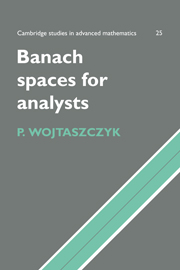Book contents
- Frontmatter
- Contents
- Preface
- Part I Introduction
- Part II Basic concepts of Banach space theory
- Part III Selected topics
- III.A Lp-spaces; type and cotype
- III.B Projection constants
- III.C L1(μ)-spaces
- III.D C(K)-spaces
- III.E The disc algebra
- III.F Absolutely summing and related operators
- III.G Schatten-von Neumann classes
- III.H Factorization theorems
- III.I Absolutely summing operators on the disc algebra
- Hints for the exercises
- List of symbols
- References
- Index
III.F - Absolutely summing and related operators
Published online by Cambridge University Press: 03 May 2010
- Frontmatter
- Contents
- Preface
- Part I Introduction
- Part II Basic concepts of Banach space theory
- Part III Selected topics
- III.A Lp-spaces; type and cotype
- III.B Projection constants
- III.C L1(μ)-spaces
- III.D C(K)-spaces
- III.E The disc algebra
- III.F Absolutely summing and related operators
- III.G Schatten-von Neumann classes
- III.H Factorization theorems
- III.I Absolutely summing operators on the disc algebra
- Hints for the exercises
- List of symbols
- References
- Index
Summary
We discuss in detail p-absolutely summing operators. The Pietsch factorization theorem, which is basic to this theory, is proved. The fundamental Grothendieck theorem is proved in its three most useful forms. Later we improve it and show the Grothendieck-Maurey theorem, that every operator from any L1-space into a Hilbert space is p-absolutely summing for all p > 0. We present the trace duality and show that the p′-nuclear norm is dual to the p-absolutely summing norm. We also introduce and discuss p-integral operators. We show the connection between cotype 2 and the coincidence of classes of p-absolutely summing operators for various p's. The extrapolation result for p-absolutely summing operators is proved. We apply Grothendieck's theorem to exhibit examples of power bounded but not polynomially bounded operators on a Hilbert space and to give some estimates for the norm of a polynomial of a power-bounded operator. We also present many applications to harmonic analysis: we construct good local units in L1(G), we prove the classical Orlicz-Paley-Sidon theorem and give some characterizations of Sidon sets.
1. In this chapter we will discuss several important classes of operators, namely p-absolutely summing, p-integral and p-nuclear operators. All these classes have some ideal properties so we will introduce the general concept of an operator ideal.
- Type
- Chapter
- Information
- Banach Spaces for Analysts , pp. 199 - 236Publisher: Cambridge University PressPrint publication year: 1991



